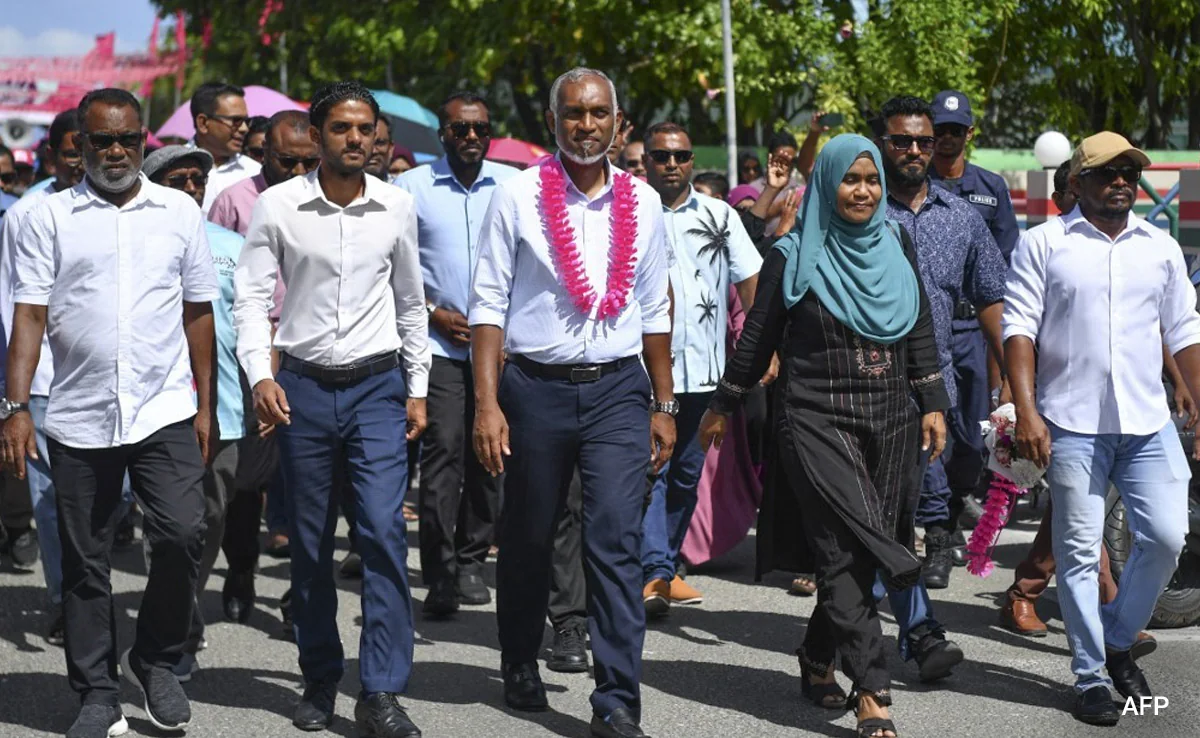Mohamed Muizzu, the pro-China presidential candidate accuses Mohamed Solih of allowing too much Indian influence, while PPM was an eager recipient of financial largesse from China.
Maldives: Solih vs. Muizzu or India vs. China?
As the Maldives goes to an election run-off on Saturday, it will not just be two presidential candidates on the ballot but a geopolitical tug-of-war between India and China, who have been engaged in a duel to gain influence over the island nation.
While the clash is certainly not new, the narrative of India versus China has reached a new high in this election, where opposition candidate Mohamed Muizzu is trying to unseat India’s perceived grasp over the Maldives under Solih, at the forefront of his campaign.
Since Solih came to power in 2018, he has made efforts to repair the historically long ties with India – while distancing it from Chinese investment and influence that had escalated under the previous regime.

source: AFP
National Sovereignty and Independence under threat – says Muizzu
Following this Muizzu has continued to accuse the incumbent Solih of endangering the national security of the island nation with its close ties with India, alleging that the current government has allowed Indian influence and military presence on Maldivian territory, which Solih denies.
Since neither candidate managed to secure more than 50% of the votes polled in the first round of elections held in early September, a final run-off will be held on 29th September i.e. Saturday, in a race that is being tightly contested.
Muizzu’s own allegiances are widely acknowledged to be pro-China. His Progressive Alliance coalition was previously in power between 2013 and 2017 under President Abdullah Yameen and its policy showcased a significant Chinese tilt, including a free trade agreement with China. Under him, Maldives became a part of President Xi Jinping’s Belt and Road project, accepting billions of dollars in loans. Muizzu, who was mayor of the capital, Malé, at the time, launched a 200 Million Dollar bridge project aided by China.
Solih secured office in 2018 owing to popular discontent with the autocratic policies of his predecessor Abdullah Yameen, Muizzu’s ally who is now serving an 11-year prison sentence for corruption. Solih had previously accused Yameen of pushing the country into a Chinese debt trap by heavy infrastructure oriented borrowing.
What does India stand to lose?
The Maldives holds pivotal strategic importance for India, China and the west. It is on the pathway of crucial east-west shipping lines for cargo, including the Gulf’s oil supplies to China. It is also seen as a pathway to larger geopolitical influence and command over the Indian ocean, particularly for China as it is growing increasingly assertive in the region.
India has stated that it has been always willing to help the Maldives and under the external affairs minister Dr. S. Jaishankar, India has also utilised soft cultural power, opening an active Indian cultural centre in Maldives’ capital. Yet India’s increased activity in the region has invited suspicion from those in the island nation. A particular source of contention have been the aircrafts given to the Maldives, which has stationed dozens of military personnel in the country to operate them, leading to allegations that India is trying to set up a strategic military presence.
The needs of Maldivian citizens
“For most voters in the Maldives, issues of economy and employment are far more important and crucial than geopolitics, and despite the fiery anti-India rhetoric, should Muizzu win the election – as it is looking increasingly likely – it is unlikely that ties with India would be severed altogether”, said Ahmed Shaheed, the former Maldives foreign minister.
Muizzu’s PPM has kept the debate focused on diplomacy by attacking Solih’s stance towards India, a country with enormous political and economic influence in the nation that has long been a source of public disaffection. Public anger against India is being seen as partly a reflection of people’s frustration with the alleged corrupt practices of Solih’s administration.



